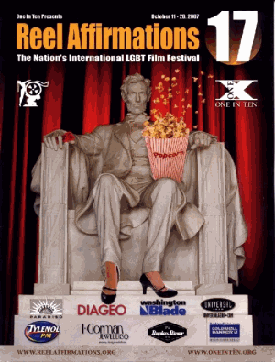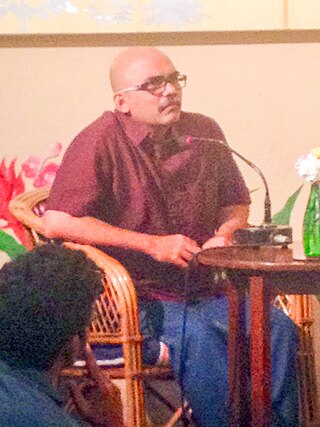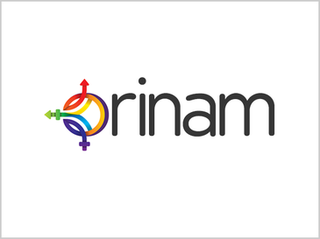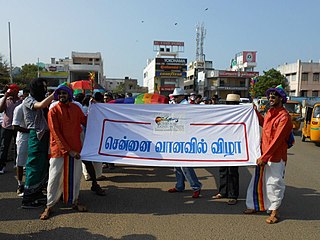Related Research Articles
Homosexuality in India has been a subject of discussion from ancient times to modern times. Hindu texts have taken various positions regarding homosexual characters and themes. The ancient Indian text Kamasutra written by Vātsyāyana dedicates a complete chapter on erotic homosexual behaviour. Historical literary evidence indicates that homosexuality has been prevalent across the Indian subcontinent throughout history.

Mouna Ragam is a 1986 Indian Tamil-language romantic drama film written and directed by Mani Ratnam, and produced by G. Venkateswaran. The film stars Mohan and Revathi, with Karthik, V. K. Ramasamy, Ra. Sankaran, Bhaskar, Kanchana, Vani, Kalaiselvi and Sonia in supporting roles. It narrates the life of Divya (Revathi), a free-spirited college girl who is forced into an arranged marriage with Chandrakumar (Mohan) by her father (Sankaran). Divya, secretly mourning her former lover Manohar (Karthik) who was shot dead, did not want to be married. The story follows Divya's inner conflict between holding onto her past and coming to terms with the present and making a life with Chandrakumar.

Moondram Pirai is a 1982 Indian Tamil-language romantic drama film written, directed and filmed by Balu Mahendra. The film stars Kamal Haasan and Sridevi, while Y. G. Mahendran, Silk Smitha and Poornam Viswanathan play supporting roles. It revolves around a school teacher who rescues a woman with retrograde amnesia, from a brothel, and protects her in his house located in Ketti. The rest of the film shows how the woman recovers her memory with the teacher's help.

Reel Affirmations (RA) is a non-profit, all-volunteer LGBT film festival in Washington, D.C. Founded in 1991 and held every year in mid-October, as of 2011 Reel Affirmations was one of the largest LGBT film festivals in the United States. Baltimore's Gay Life newspaper called it "one of the top three films festivals for the entire LGBT community." A 2007 guidebook claims it was one of the largest LGBT film festivals in the world. A listing of LGBT film festivals claims it is the largest all-volunteer film festival in the world.

Lesbian, gay, bisexual and transgender (LGBT) rights in Tamil Nadu are the most progressive among all states of India. Tamil Nadu was the first state in India to introduce a transgender welfare policy, wherein transgender individuals can access free gender affirmation surgery in government hospitals and various other benefits and rights. The state was also the first to ban forced sex-selective surgeries on intersex infants, and also the first state to include an amendment in its state police guidelines that expects officers to abstain from harassing the LGBTQIA+ community and its members. The state also became the first to ban conversion therapy and the first to introduce LGBTQIA+ issues in school curricula.

Baradwaj Rangan is an Indian film critic, writer, and formerly the deputy editor of The Hindu. He later became a senior editor of Film Companion. Rangan won the National Film Award for Best Film Critic in 2006. Before joining The Hindu, Rangan wrote for The New Indian Express. He has also authored two books, worked as a screenwriter, and is a teacher at the Asian College of Journalism, Chennai.

Leena Manimekalai is an Indian filmmaker, poet and an actor. Her works include five published poetry anthologies and several films in genres, documentary, fiction and experimental poem films. She has been recognised with participation, mentions and best film awards in many international and national film festivals.

India has a vibrant LGBTQ culture, especially in its large cities due to growing acceptance in the recent years.
C. V. Kumar is an Indian Tamil film producer, director and distributor who heads the production studio Thirukumaran Entertainment. Known for producing innovative and critically acclaimed films, Kumar has also primarily introduced new talent into the film industry in terms of actors and technicians. His first three films, Attakathi, Pizza and Soodhu Kavvum won critical acclaim as well as bringing in revenue of over ₹50 crore (US$6.3 million). After producing successful films, Kumar began work on his first directorial venture in 2014.
This is a timeline of notable events in the history of non-heterosexual conforming people of South Asian ancestry, who may identify as LGBTIQGNC, men who have sex with men, or related culturally-specific identities such as Hijra, Aravani, Thirunangaigal, Khwajasara, Kothi, Thirunambigal, Jogappa, Jogatha, or Shiva Shakti. The recorded history traces back at least two millennia.
Chennai has LGBTQIA cultures that are diverse concerning- socio-economic class, gender, and degree of visibility and politicisation. They have historically existed in the margins and surfaced primarily in contexts such as transgender activism and HIV prevention initiatives for men having sex with men (MSM) and trans women (TG).
Bangalore is a multicultural city and has experienced a dramatic social and cultural change with the advent of the liberalization and expansion of the information technology and business process outsourcing industries in India. With much expatriate population in the city, Bangalore is slightly more relaxed.

Kuttram Kadithal is a 2015 Tamil-language independent drama film written and directed by Bramma in his debut, and produced by J. Satish Kumar and Christy Siluvappan under the JSK Film Corporation and Chris Pictures banner. It features Master Ajay, Radhika Prasidhha, Sai Rajkumar, and Pavel Navageethan.
XUKIA is a queer collective based in Assam, India that works for LGBT issues in the region. It is one of the first Queer Collectives to come up in the North East India.

Orinam is a non-funded, social, and activist collective that works to enhance understanding of alternate sexualities and gender identities among families, communities and society. It was founded in 2003 in Chennai under the name MovenPick and is one of the oldest collective of its kind in India. People affiliated with Orinam are from or trace their ancestry to the following geo-cultural: People of Tamil Origin from Tamil Nadu, India. Orinam provides a platform for creative expression, personal and social commentary by Queer people of Tamil Origin and of Indian Origin primarily. Orinam also acts as a local support group in Chennai for the queer community. Orinam also partners with the city-, state- and national initiatives around decriminalisation of homosexuality by amending Section 377 of the Indian Penal Code and LGBTQ rights.

The Chennai Rainbow Pride March has been held by members of Tamil Nadu LGBTIQA+ communities every June since 2009. The pride march is organised under the banner Tamil Nadu Rainbow Coalition, which is a collective of LGBT individuals, supporters, and organizations working on human rights and healthcare for the LGBTQIA community. The Pride March occurs on the final Sunday of June every year. The Pride March is usually preceded by a month-long series of events organized by NGOs and organizations to inculcate awareness and support for the LGBTQ community, such as panel discussions, film screenings, and cultural performances. The Chennai Vaanavil Suyamariyadhai Perani a.k.a. Chennai Rainbow Self-Respect March is known for being inter-sectional in nature as it addresses issues with multiple axes such as caste, class, religion coupled with gender discrimination.
Kolkata Rainbow Pride Walk (KRPW) is the oldest pride walk in India and South Asia. The first march in Kolkata was organised on 2 July 1999. The walk was called The Friendship Walk. Kolkata was chosen as the first city in India to host the march owing to Kolkata's history of movements for human and Political Rights. Currently, Kolkata Rainbow Pride Walk is organised by the Kolkata Rainbow Pride Festival (KRPF).
Queer Campus Bangalore is a support group and safe space for queer youth in Bangalore, India. It is open to school, college, and university going youth in the city.
Tamil sexual minorities are Tamil people who do not conform to heterosexual gender norms. They may identify as LGBTQIA. It has been estimated that India has a population of 2.5 million homosexuals, though not all of them are Tamil, and not all Tamils live in India.
The following list is a partially completed compilation of events considered to have a profound effect on the welfare or image of Tamil sexual minorities. The use of bold typeface indicates that the event is widely considered to be landmark:
References
- 1 2 3 Rao, Subha J. (28 July 2016). "Where the mind is without fear". The Hindu. Retrieved 19 June 2017.
- 1 2 Preeti Zachariah (24 July 2015). "Preview: Chennai International Queer" . Retrieved 22 July 2017.
- ↑ Baradwaj Rangan (25 July 2014). "The genre and the specific". The Hindu. Retrieved 22 July 2017.
- ↑ "Reel Desires: Chennai International Queer Film Festival 2017". 25 July 2017. Archived from the original on 2 August 2021. Retrieved 3 August 2017.
- ↑ "Chennai: Queer film festival returns, explores asexuality and more". The Times of India . 27 July 2017.
- ↑ Chitradeepa Anantharam (27 July 2017). "Celebrating queer pride". The Hindu.
- ↑ Abinaya Kalyanasundaram (26 July 2017). "Real queer stories on reel".
- ↑ "LGBT Film Festival On July 24–26 In Chennai". 22 July 2015. Retrieved 22 July 2017.
- ↑ RAHUL SADHU (27 July 2015). "Queer film festival comes to Chennai" . Retrieved 22 July 2017.
- ↑ "Bringing out the 'Reel' desires". New Indian Express. 26 July 2014. Retrieved 22 July 2017.
- ↑ "Reel Desires- Queer Film Festival".
- ↑ BARADWAJ RANGAN (9 July 2013). "Nothing queer about it!". The Hindu. Retrieved 22 July 2017.